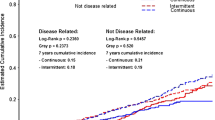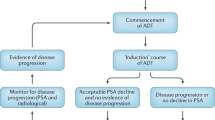Abstract
Research on hormonal treatments of prostate cancer over the past 20 y have focused on maximizing androgen ablation through combination therapy. Maximal androgen ablation increases treatment-related side-effects and expense and fails to prolong time to androgen-independent (AI) progression. The rationale behind intermittent androgen suppression (IAS) is based on: (1) observations that androgen ablation is palliative, not curative in most patients where quality of life must be considered; (2) assumption that immediate androgen ablation is superior to delayed therapy in improving survival of patients with prostate cancer; and (3) the hypothesis that if tumor cells which survive androgen withdrawal are forced into a normal pathway of differentiation by androgen replacement, then apoptotic potential might be restored and progression to androgen independence may be delayed. Observations from animal model studies suggest that progression to androgen-independence involves adaptive responses to androgen deprivation which are, in turn, modulated by intermittent androgen replacement.
Supported by these animal model observations, several centers have now tested the feasibility of IAS therapy in non-randomized groups of patients with prostate cancer using serum PSA as trigger points. Experimental and clinical data suggest that prostate cancer is amenable to control by IAS. IAS may offer clinicians an opportunity to improve quality of life in patients with prostate cancer by balancing the benefits of immediate androgen ablation (delayed progression and prolonged survival) while reducing treatment-related side effects and expense. Whether time to progression and survival is affected in a beneficial or adverse way is being studied in randomized, prospective protocols. The purpose of this article is to review the rationale behind IAS, compare observations from published series, and discuss potential indications and treatment strategies using IAS.
Similar content being viewed by others
Author information
Authors and Affiliations
Rights and permissions
About this article
Cite this article
Gleave, M., Goldenberg, S., Bruchovsky, N. et al. Intermittent androgen suppression for prostate cancer: rationale and clinical experience. Prostate Cancer Prostatic Dis 1, 289–296 (1998). https://doi.org/10.1038/sj.pcan.4500260
Received:
Revised:
Accepted:
Published:
Issue Date:
DOI: https://doi.org/10.1038/sj.pcan.4500260
- Springer Nature Limited
Keywords
This article is cited by
-
PDIA2 has a dual function in promoting androgen deprivation therapy induced venous thrombosis events and castrate resistant prostate cancer progression
Oncogene (2024)
-
Intermittent versus continuous androgen deprivation therapy for advanced prostate cancer
Nature Reviews Urology (2020)
-
Environmental endocrine disruptors: Effects on the human male reproductive system
Reviews in Endocrine and Metabolic Disorders (2015)
-
Lyn tyrosine kinase regulates androgen receptor expression and activity in castrate-resistant prostate cancer
Oncogenesis (2014)
-
Targeting and Killing of Metastatic Cells in the Transgenic Adenocarcinoma of Mouse Prostate Model With Vesicular Stomatitis Virus
Molecular Therapy (2013)




